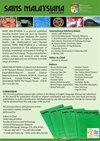Toxicity of Clove Oil Nanoparticles against Diamondback Moth Plutella xylostella (L.)
IF 0.8
4区 综合性期刊
Q3 MULTIDISCIPLINARY SCIENCES
引用次数: 0
Abstract
Plutella xylostella, diamondback moth (DBM), has been one of the most challenging insects to control in the world to date. Environmentally friendly methods of control, such as the use of botanical insecticides, are available. A formulation that can sustain the main compound's level is required, which can be accomplished through soluble powder nanoformulation. The goal of this research was to test and evaluate the ability of clove oil nanoparticles produced from polyethylene glycol 6000 (PEG 6000) to control DBM utilizing a solid dispersion technique. Bioassay by leaf dip method in laboratory was used to test the lethal effect of clove oil nanoparticles (CO-NPs) on DBM. Clove oil nanoformulation was successful because it produced nanoparticles (179.98 nm in diameter) while maintaining high levels of the active component eugenol. Clove oil nanoparticles may increase clove oil's toxicity to DBM, seen from the LC50 value after 24 h of treatment. The LC50 values for clove oil nanoparticles after 24 and 48 h of treatment were 10.308 and 9.451%, respectively.丁香油纳米粒子对小菜蛾的毒性研究
小菜蛾是迄今为止世界上最难控制的昆虫之一。可以采用无害环境的控制方法,例如使用植物杀虫剂。需要一种能够维持主要化合物水平的制剂,这可以通过可溶性粉末纳米制剂来实现。本研究的目的是测试和评估由聚乙二醇6000(PEG 6000)制备的丁香油纳米颗粒利用固体分散技术控制DBM的能力。采用浸叶法测定丁香油纳米粒子对DBM的致死作用。丁香油纳米制剂之所以成功,是因为它产生了纳米颗粒(直径179.98纳米),同时保持了高水平的活性成分丁香酚。从处理24小时后的LC50值可以看出,丁香油纳米颗粒可能增加丁香油对DBM的毒性。丁香油纳米颗粒在处理24和48小时后的LC50值分别为10.308和9.451%。
本文章由计算机程序翻译,如有差异,请以英文原文为准。
求助全文
约1分钟内获得全文
求助全文
来源期刊

Sains Malaysiana
MULTIDISCIPLINARY SCIENCES-
CiteScore
1.60
自引率
12.50%
发文量
196
审稿时长
3-6 weeks
期刊介绍:
Sains Malaysiana is a refereed journal committed to the advancement of scholarly knowledge and research findings of the several branches of science and technology. It contains articles on Earth Sciences, Health Sciences, Life Sciences, Mathematical Sciences and Physical Sciences. The journal publishes articles, reviews, and research notes whose content and approach are of interest to a wide range of scholars. Sains Malaysiana is published by the UKM Press an its autonomous Editorial Board are drawn from the Faculty of Science and Technology, Universiti Kebangsaan Malaysia. In addition, distinguished scholars from local and foreign universities are appointed to serve as advisory board members and referees.
 求助内容:
求助内容: 应助结果提醒方式:
应助结果提醒方式:


